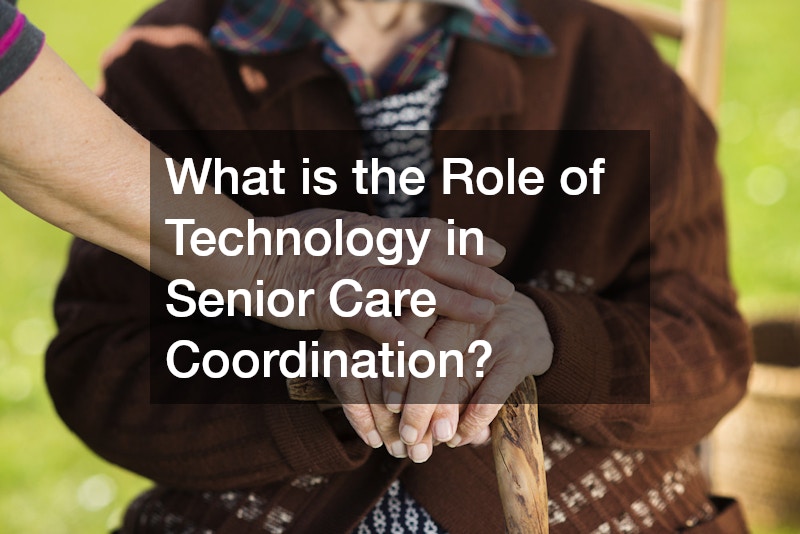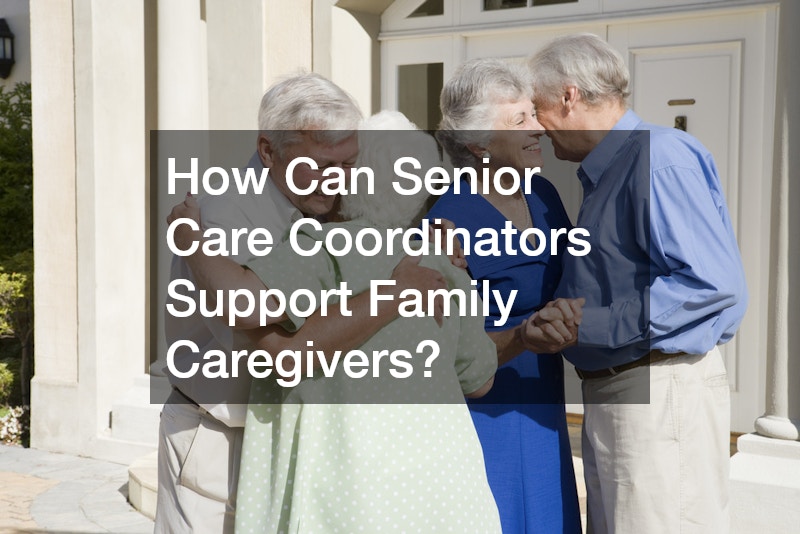
In the intricate landscape of healthcare, the role of a Senior Care Coordinator is pivotal. By bridging the gap between seniors, their families, and healthcare providers, Senior Care Coordinators significantly enhance the quality of life for the elderly. This article explores the essential roles, responsibilities, and the profound impact that these professionals have on the lives of seniors and their families.
What Does a Senior Care Coordinator Do?

Senior Care Coordinators are vital in crafting personalized care plans that address the unique needs of each senior. Their work often includes coordinating between various service providers, such as assisted living apartments and home hospice care agencies. As liaisons, they ensure seamless communication and delivery of services.
The responsibilities of a Senior Care Coordinator extend to monitoring the ongoing health status of their clients. This involves frequent assessments, ensuring that any changes in health conditions are promptly addressed, whether through local rehabilitation therapy or adjustments in medications prescribed by a cardiology specialist. By maintaining this vigilance, coordinators offer reassurance to families who entrust their loved ones to professional care.
Additionally, Senior Care Coordinators manage logistical challenges, such as transportation to healthcare appointments, which may range from visits to a neuro rehab center to regular eye check-ups at a local eyeglass store. Their involvement ensures that seniors receive comprehensive and continued care without facing the stress of managing these aspects themselves.
What Skills are Essential for a Senior Care Coordinator?
A Senior Care Coordinator must possess a broad spectrum of skills to be effective in their role. Strong communication abilities are paramount, allowing them to convey complex medical information to seniors and their families. These skills also aid in effectively liaising with healthcare entities such as a hospice billing company and local urgent care clinics.
Another crucial skill is empathy, which enables coordinators to engage meaningfully with their clients and understand their unique emotional and physical needs. This empathetic approach assists in building trust and fostering an environment where seniors and their families feel valued and understood. Moreover, empathy enhances satisfaction, ensuring that care plans align with individual preferences and situations.
Organizational skills also play an essential role for a Senior Care Coordinator to juggle multiple cases effectively. This includes scheduling, record-keeping, and coordinating appointments across different specialties, such as varicose veins treatments or consultations with a cardiology specialist. Highly organized coordinators can streamline operations, ensuring that nothing falls through the cracks.
How to Become a Senior Care Coordinator?
The pathway to becoming a Senior Care Coordinator typically involves pursuing a relevant educational background. Degrees in fields such as healthcare administration, social work, or nursing provide foundational knowledge essential for this role. This educational grounding prepares coordinators to tackle the multi-faceted challenges they will encounter.
Training programs and certifications further enhance one’s qualification for a Senior Care Coordinator position. Specialized training, including gerontology and patient advocacy, equips aspiring coordinators with the skills to effectively assess and implement care strategies. Additionally, gaining practical experience through internships or entry-level positions in assisted living apartments or similar settings is invaluable for practical learning.
Continuing education is a crucial component in this field, as healthcare practices and technologies continually evolve. Staying updated on the latest developments ensures that Senior Care Coordinators employ best practices in managing care. Engaging in professional organizations and workshops also facilitates ongoing learning and networking within the healthcare community.
What Are the Challenges Faced by Senior Care Coordinators?

One common challenge faced by Senior Care Coordinators is the need to balance numerous and sometimes conflicting priorities. With seniors increasingly requiring more personalized care due to complex health conditions, coordinators must adeptly allocate their time and resources. This balancing act is complicated further when coordinating between multiple service providers, such as those offering home hospice cares or neuro rehab center services.
Another challenge involves navigating the emotional stress that comes with caring for elderly individuals. Coordinators often interact with families during emotionally charged periods, requiring them to provide unwavering support and guidance. Handling these situations tactfully can significantly affect families’ experiences during trying times.
Additionally, financial and bureaucratic hurdles, including healthcare insurance and working with a hospice billing company, add another layer of complexity to a Senior Care Coordinator’s role. Developing strategies to overcome these administrative challenges is essential in ensuring that their clients receive necessary services without undue delays.
Why is Communication Important for Senior Care Coordinators?
Effective communication is the cornerstone of successful senior care coordination. By maintaining open and reliable lines of communication, coordinators ensure that all involved parties, including family members and various care professionals, are on the same page. This is essential when handling sensitive issues related to healthcare needs and resource allocation.
An integral part of effective communication involves tailoring messages to suit the audience. For instance, when interacting with seniors, especially in assisted living apartments, coordinators must use language that is compassionate and easy to understand. When liaising with healthcare professionals, they must focus on precise and factual communication, ensuring that critical information is not lost in translation.
Moreover, communication skills greatly impact how coordinators manage conflicts and resolve issues that arise. Providing clear and constructive feedback, as well as actively listening to concerns, helps in developing solutions that satisfy all parties involved. Thus, Senior Care Coordinators act as a central point of contact, harmonizing the efforts of healthcare teams and family members effectively.
How Do Senior Care Coordinators Manage Multiple Cases?
Senior Care Coordinators often juggle multiple cases simultaneously, necessitating a high level of organizational acumen. Utilizing various tools and techniques is fundamental in managing these workflows effectively. Digital tools such as calendar applications and case management software are invaluable in scheduling and tracking patient care requirements.
Furthermore, prioritization skills enable coordinators to address urgent needs without neglecting other responsibilities. Identifying immediate action items versus those that can be scheduled for later is essential in delivering consistent care. For instance, scheduling visits to a local urgent care clinic may take precedence over routine follow-ups with a cardiology specialist.
Delegation and collaboration with other care team members also play a critical role in managing cases efficiently. Sharing tasks with colleagues, especially in bustling settings such as local rehabilitation therapy centers, ensures that all aspects of senior care are meticulously attended to and that coordinators can focus on clients with the most pressing needs.
What is the Role of Technology in Senior Care Coordination?

Technology has significantly transformed the role of a Senior Care Coordinator, improving efficiency and care quality. Digital health records and management systems allow for better tracking of patient histories, ensuring continuity of care across various healthcare settings. This makes it easier to access accurate information when coordinating care across different service providers, such as those in home hospice cares or a neuro rehab center.
Telecommunication advancements enable coordinators to maintain regular contact with clients and their families, even from a distance. Video calls and messaging apps facilitate ease of communication, providing an alternative to in-person meetings, which may be challenging for seniors to attend regularly. This approach offers flexible yet direct interaction, enhancing the sense of connectedness and ongoing support.
Incorporating mobile health technologies, such as remote patient monitoring devices, allows for real-time data collection. These innovations can provide insights into seniors’ health conditions, helping to anticipate needs and adjust care plans accordingly. By utilizing technology, Senior Care Coordinators can deliver more personalized and proactive care.
How Do Senior Care Coordinators Ensure Quality of Care?
Ensuring quality of care is fundamental to the role of a Senior Care Coordinator. They begin by establishing care standards tailored to each senior’s needs, preferences, and health conditions. Frequent evaluations and feedback mechanisms are integral to maintaining high standards.
Coordinators also engage in continuous monitoring of service delivery quality. By maintaining close partnerships with trusted healthcare providers, whether an eyeglass store or a cardiology specialist, they can guarantee that the services rendered meet predetermined care standards. Regular audits and satisfaction surveys help to assess the effectiveness of interventions and guide necessary adjustments.
Education and training offered to both clients and their families support the pursuit of quality care. By equipping families with knowledge and resources, such as webinars or workshops held by local community centers, coordinators empower them to be proactive advocates for their loved ones. This collaborative approach fosters a holistic care environment where the senior’s well-being remains the focus.
What Legal and Ethical Considerations Must Be Addressed?
Senior Care Coordinators face numerous legal and ethical considerations that require careful attention. Confidentiality is a primary concern, and coordinators must ensure compliance with regulations like the Health Insurance Portability and Accountability Act (HIPAA) to protect sensitive patient information. This includes managing how information is shared with family members and other healthcare services.
Informed consent is another vital legal concept, emphasizing the importance of obtaining permission before implementing care plans. Coordinators need to ensure that seniors or their authorized representatives fully understand and agree to the interventions proposed. This transparency is critical in honoring the autonomy and rights of elderly clients.
Ethical considerations often involve navigating difficult moral situations, such as end-of-life care decisions. Collaborating with entities like a hospice billing company and understanding the ethical policies of home hospice cares, coordinators must guide families with compassion and adherence to professional ethics. Balancing these responsibilities requires a deep commitment to ethical standards and practices.
How Can Senior Care Coordinators Support Family Caregivers?

Supporting family caregivers is a meaningful aspect of a Senior Care Coordinator’s role. By providing resources and educational materials, coordinators empower caregivers to manage daily challenges effectively. This can include guidance on navigating healthcare systems, understanding medical conditions, and utilizing support services.
Regular communication and emotional support are invaluable services that coordinators offer to family caregivers. Through regular check-ins and meetings, coordinators create a safe space for caregivers to express concerns and seek advice. This supportive relationship can alleviate the emotional burdens often borne by caregivers, enhancing their ability to provide effective care.
Offering respite care and connecting family caregivers with community resources, such as support groups or a local rehabilitation therapy center, also forms part of the comprehensive support offered. Senior Care Coordinators play a crucial role in ensuring that family caregivers have the necessary tools and assistance to care for their loved ones without overwhelming stress.
Senior Care Coordinators are crucial to the healthcare continuum, combining empathy, skills, and knowledge to support seniors and their families. By ensuring seamless coordination of various services from assisted living apartments to local independent senior apartments, they play a critical role in enhancing the quality of life for the elderly. Their dedication to professional excellence not only benefits those in their immediate care but also enriches the broader healthcare system.
Becoming a Senior Care Coordinator represents a meaningful career path for those passionate about elder care. With the healthcare landscape ever-evolving, these professionals adapt and innovate to meet new challenges, continuously raising the standard of care provided to seniors. The field’s complexity ensures that each day presents opportunities for learning and growth, both personally and professionally.
Furthermore, Senior Care Coordinators provide much-needed emotional and logistical support to family caregivers, offering guidance and resources that make caregiving more manageable. Their ability to navigate complex healthcare systems, advocate for their clients, and foster communication between multiple stakeholders makes them invaluable assets in the aging services sector.
As the aging population continues to grow, the demand for skilled and compassionate Senior Care Coordinators will only increase. This role is not just a profession but a calling—one that requires deep commitment, resilience, and an unwavering dedication to improving the lives of elderly individuals. By embracing the challenges and rewards of this field, Senior Care Coordinators help create a future where seniors receive the dignity, care, and respect they deserve. Their impact resonates beyond individual clients, shaping a more compassionate and efficient healthcare environment for generations to come.
In addition to their professional responsibilities, Senior Care Coordinators serve as advocates for policy improvements in senior healthcare. By working closely with policymakers and healthcare organizations, they contribute to shaping regulations that enhance senior care services. Their insights, gathered from hands-on experience, provide valuable guidance in crafting policies that address the evolving needs of an aging population. As they continue to champion better healthcare solutions, Senior Care Coordinators play an integral role in driving systemic change that benefits both current and future generations of seniors.







